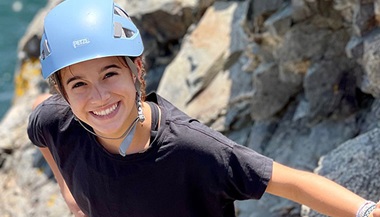Patient Story
Chronic Pain: Tracie's Story
- Tracie became dependent on opioids after being diagnosed with a brain tumor.
- She was referred to Chronic Pain Clinic at Johns Hopkins All Children's.
- After a year of implementing their plan of non-narcotic interventions, Tracie is now opioid-free.

Tracie, 19, was addicted to pain medications throughout the majority of her teenage years. But it didn’t start as recreational use. She became dependent on opioids after being diagnosed with a brain tumor.
“I had chronic pain, but then as I had several different surgeries, the pain started to get worse,” explains Tracie. “I was just taking painkillers regularly around the clock and it was like I was taking them to subside the pain of life.”
Tracie’s tumor is non-cancerous, but it is also inoperable–only 15 percent of it could be removed or she could potentially lose memory and/or have to relearn simple tasks like eating, walking and talking. Most of her surgeries are shunt revisions, which is a tube near her tumor that allows spinal fluid to drain.
“Being on all those pain meds and everything, I wasn’t able to attend school like a normal kid,” Tracie says. “I was constantly at home, doing nothing. I lost so many friends.”
Tracie was initially cared for in Orlando, where she’s from, but eventually sought neurosurgery care at Johns Hopkins All Children’s Hospital. Neurosurgery assessed how negatively Tracie’s years of opioid addiction was impacting her quality of life and referred her to the new Chronic Pain Clinic at Johns Hopkins All Children’s.
“When we met Tracie, she was in the hospital, incapacitated and dependent on opiate medication. She really wasn’t able to function or go to school–do all the things teenagers should be able to,” explains Richard Elliott, M.D., FAAP, CETHP, CPMT, pediatric anesthesiologist at Johns Hopkins All Children’s. “Our goal really is to get kids back to functioning.”
That’s exactly what the team was able to do. After a year of implementing their plan of non-narcotic interventions, including peripheral nerve blocks, guided imagery, music therapy and help from a psychologist, Tracie is now opioid-free. She can recall that moment.
“I could not have been happier. I could feel the difference,” she says. “I could begin having a normal life.”
Now she comes into clinic every couple of months for some nerve blocks for both her headaches and chronic post-surgical pain and will soon try Botox as a treatment option.
“The team has been great,” Tracie says. “Without them, I wouldn’t be living the normal life that I have now. That was always their goal. I was going to be able to live a normal life.”
The chronic pain clinic has now been open for just over a year and continues to grow, serving an underserved pediatric population suffering from pain.
“There’s nothing on the west coast of Florida for pediatric patients to really have access to pain care,” Elliott says. “There’s more and more data and studies showing that both in adults and children that pain is a disease rather than a consequence of disease.”
Elliott couldn’t be happier to see how his team’s care impacts the lives of his patients like Tracie.
“Tracie really is a sweetheart,” says Elliott. “She’s starting to make friends again and participate in life. It’s really amazing and every time I see her it warms my heart. It makes me smile.”


.jpg?h=320&iar=0&w=560&hash=63A2A3AB594C8B2327D45CA9ECE160F3)
.jpg?h=217&iar=0&mh=260&mw=380&w=380&hash=F5A6A8E2018118EBA1003810EA2717BA)

